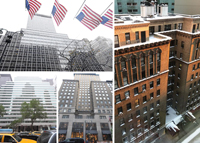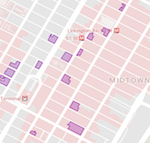
(Getty/Illustration by Kevin Rebong for The Real Deal)
Move over, Williamsburg. Here comes … Midtown?
Residents and brokers who specialize in the area — known for aging office buildings and executives — say it has been transforming during the city’s recovery, getting younger, hipper and trendier.
It can surely use the new blood.
The skyscraper-laden district stretching from 34th Street to Central Park South was disemboweled by the pandemic and continues to bleed office tenants, even as other pockets of the city appear ready to move on from the pandemic.
Banks and tech companies have been looking to the south and west, with companies including Google and Meta Platforms buying space in lower Manhattan and HSBC signing a 20-year lease in Hudson Yards. Meanwhile, with occupancy rates remaining low, the total value of New York’s office buildings fell for the first time in over two decades.
They won’t go to the Upper East Side, but they think it’s cool to live in Midtown.
That’s cast a cloud of uncertainty over the neighborhood, which is home to some of the city’s most iconic real estate.
But while older office towers languish, brokers say young home buyers have flocked to the neighborhood, eager to take advantage of prices that haven’t soared like they have in the rest of Manhattan and much of Brooklyn.
“All of a sudden we have people moving from Downtown, all of a sudden you have these people who think it’s cool to be living further up,” said Bertrand Buchin, a real estate agent with Douglas Elliman. “They won’t go to the Upper East Side, but they think it’s cool to live in Midtown.”
Read more


Shilpa, a businesswoman in her 20s who’s lived in Midtown since 2018 and recently bought a condo on East 50th between Lexington Avenue and 3rd Avenue, said she never really considered moving elsewhere. Her last name was omitted to protect her privacy.
“I think it’s a really nice residential area,” she said.
She went on to explain why she wasn’t sold on the West Village, a perennially in-demand neighborhood known for its luxury residences, restaurants and nightlife.
“If you’re using the subway, it’s really inconvenient to get to and get to other places,” she said.
Brokers said the pandemic accelerated a pre-pandemic trend of hipper residents moving to Midtown, as stodgy bankers and executives move away, usually for bigger spaces elsewhere in the city or the suburbs. The area remains a relative bargain for young, high-earning professionals who want to walk to work and the amenities and convenience of Midtown.
While the neighborhood’s residential market has historically trailed others in the borough, the price per square foot has started to rebound to pre-pandemic highs, though deals remain.
“I feel like I can spend a lot of my time actually just in Midtown East now, there’s so many restaurants,” Shilpa said, adding that she’s observed a noticeable shift in the area over the past four years.
Prices in Midtown — unlike in most parts of the city and elsewhere — are not at record highs, making it an enticing market for younger and first-time buyers. However, inventory is dropping and prices are rising, so deals may not be around for much longer, according to data from Brown Harris Stevens.
The median price of a one bedroom condo in Midtown so far this year is just under $1.4 million, up from last year, but down from a peak of $1.6 million. Supply has fared better than in other Manhattan neighborhoods, but has still fallen in the past year.
“The secret for finding value is really where there’s inventory — where there’s the most for sale,” said Brown Harris Stevens broker Clifford Marks. “We are seeing opportunities for savvy buyers in the Midtown market.”
Douglas Elliman broker Diane Johnson said there is wiggle room at the new development she’s marketing at 138 East 50th Street called The Centrale.
“We’ll negotiate still,” she said.
They’re talking about the office occupancy, but from the retail and residential standpoint it seems like it’s on fire.
David Abrams, founder and CEO of masonre, a commercial real estate firm, said demand for Midtown retail space has spiked among “cooler” health and fitness brands in the past three months, and that smart operatives knew to start looking there last summer. It’s a sign the neighborhood is in fact skewing younger, he said: Brands only want to maintain a presence in areas where they have customers.
Restaurant and club owners have also taken note of the neighborhood’s changing demographics.
Among the recent arrivals are Pebble Bar on West 49th Street, which boasts a star-studded investor roster including Saturday Night Live star Pete Davidson; The Hugh, a food court that opened in November at 601 Lexington Avenue that’s home to places like KazuNori; and Lodi, an Italian cafe opened at 1 Rockefeller Center last summer by the owners of Village staple Altro Paradiso.
“Everyone’s talking crap about Midtown and it’s because they don’t know about the retail deals,” Abrams said. “They’re talking about the office occupancy, but from the retail and residential standpoint it seems like it’s on fire.”
Buchin said he found out the hard way that Lodi caters to locals when he showed up for an impromptu drink with a friend on a recent weekend afternoon.
“At 3:15 I thought I was going to get in there and they told me it’s an hour-and-15-minute wait,” Buchin said. “It’s young people on the terrace, not the same crowd that comes to look at Rockefeller Center … You never would have seen this three years ago.”
